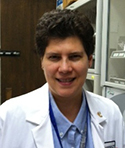In an efficacy and safety study of guselkumab, patients with active psoriatic arthritis taking guselkumab showed continued skin clearance and joint symptom relief, as well as statistically significant inhibition of joint damage, after two years.


Michele B. Kaufman, PharmD, BCGP, is a freelance medical writer and editor. She is also a pharmacist at New York Presbyterian Hospital–Lower Manhattan campus. She has been a past guest lecturer at Touro College of Pharmacy in New York City for the Medical Writing elective. Dr Kaufman is a member of the New York City Society of Health-Systems Pharmacy, the New York State Council of Health-System Pharmacists, the Academy of Managed Care Pharmacy (AMCP)—Northeast Region Affiliate Chapter, the American Society of Consultant Pharmacists and the Empire State-Metropolitan NY Chapter of the American Medical Writers Association. She received her BS in Pharmacy from the University of Rhode Island (URI) College of Pharmacy and her Doctor of Pharmacy degree from Massachusetts College of Pharmacy and Allied Health Sciences in Boston. She also completed a Drug Information Fellowship at the URI Drug Information Center/Roger Williams Medical Center in Providence, R.I. Dr Kaufman is a registered pharmacist and is a Board-Certified Geriatric Pharmacist.

In an efficacy and safety study of guselkumab, patients with active psoriatic arthritis taking guselkumab showed continued skin clearance and joint symptom relief, as well as statistically significant inhibition of joint damage, after two years.

The use of biosimilar treatments is increasing, according to surveys conducted in 2018 and 2020 of rheumatologists from eight countries. In the two-year period, Japan had the largest increase in biosimilar prescriptions, with only 6% of surveyed rheumatologists reporting they prefer prescribing originator biologic agents.

Fear of injection decreased when patients with RA switched from self-administering a treatment biosimilar to etanercept in a prefilled syringe to an injector pen, according to a small observational study.

As the U.S. and other patents for branded denosumab products get closer to expiring, drug manufacturers are initiating clinical trials for more affordable, biosimilar versions of the treatment.

Pegloticase is safe and effective to treat patients with refractory gout who are undergoing dialysis, according to recently presented research.

A recent study of data from the FDA’s Adverse Event Reporting System reveals that 14 drugs commonly prescribed by rheumatologists are on the list of the top 50 drugs that can cause anaphylaxis.

Subcutaneous tocilizumab is the first biologic agent approved by the FDA treat patients with systemic sclerosis-associated interstitial lung disease.

In December, the FDA approved belimumab, the first drug approved to treat lupus nephritis, an historic action that was rapidly followed in January by the approval of a second treatment for lupus nephritis, voclosporin.

Clinical trials of biosimilar treatments, including a phase 1 study of SB17, which is biosimilar to ustekinumab, and two phase 3 studies investigating of SB16, which is biosimilar to denosumab, are currently recruiting.

In Canada, a subcutaneous formulation of CT-P13, which is biosimilar to infliximab, was approved to treat rheumatoid arthritis.